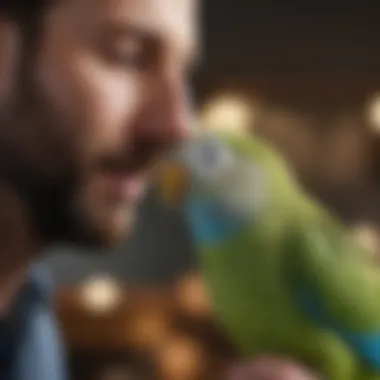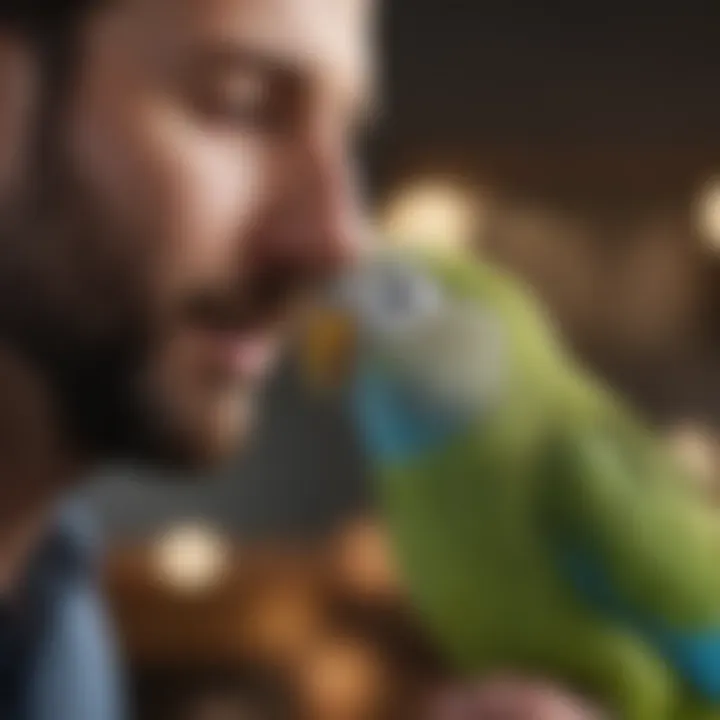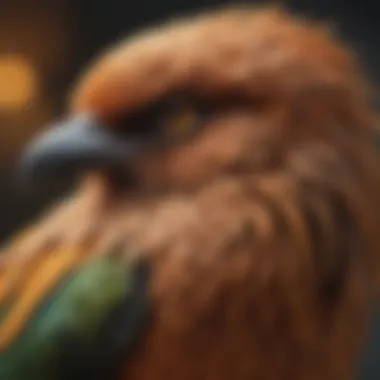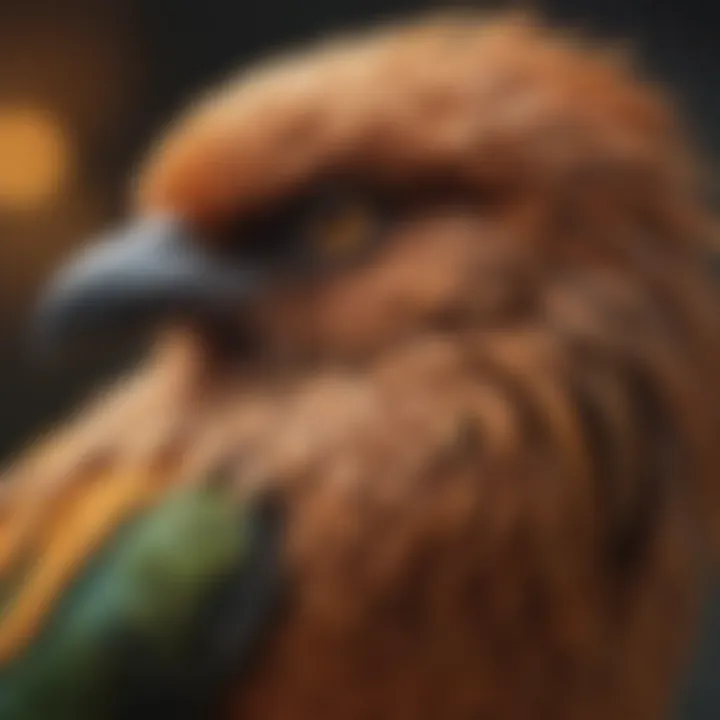Choosing the Right Pet Bird: A Complete Guide


Intro
Choosing a pet bird can be both an exciting and daunting task. With so many species to choose from, each with its own set of needs and behaviors, it’s important to approach this decision with careful consideration. Birds are more than just beautiful creatures; they require commitment, love, and an understanding of their unique needs. This guide aims to shed light on what it takes to select the right avian companion, ensuring potential bird owners are well-prepared for the journey ahead.
When thinking about adding a bird to your home, there are several critical factors to deliberate. Questions such as: What species fits well with my lifestyle? How much space do I need? What are the long-term commitments associated with different birds? These are just a few of the queries that will be addressed throughout this article.
By the end, potential bird owners should feel equipped with the necessary knowledge to make an informed choice that leads to a harmonious relationship with their feathery pals. Let's dive right in!
Avian Care Basics
Importance of Proper Nutrition
Feeding your bird a balanced diet is paramount for its health. Just like us, birds need a mix of nutrients to thrive. Fresh fruits, veggies, and high-quality pellets should form the core of their diet. Some bird owners think that seeds alone are enough, but that’s not true. Seeds, while tasty, lack essential vitamins.
To ensure your bird is munching healthily, you might consider this simple outline:
- Fruits: Apples, bananas, and berries are favorites.
- Vegetables: Leafy greens like kale and broccoli can add vital nutrients.
- Pellets: Opt for a brand that’s free from artificial colors and flavors.
- Seeds: Treat them sparingly as a snack, not a staple.
Understanding Bird Species and Their Needs
Different bird species have vastly different temperaments and requirements. For instance, a budgie may need less space and social interaction than a larger macaw. Get to know what each species requires.
- Budgerigar: Vibrant little fellows that love human interaction but are relatively low maintenance.
- Cockatiel: Indie spirits with a love for music but also need companionship.
- African Grey: Highly intelligent, these birds require mental stimulation and ample social engagement.
Take time to do some research about any species that catches your eye. Knowing their behavioral patterns can help you meet their needs adequately.
Basics of Birds Habitat Setup
Creating a suitable habitat is one of the first steps in welcoming a bird home. Each bird species has different space requirements, and it’s essential to provide an environment that mimics their natural habitat to some extent.
- Cage Size: Make sure the cage is spacious enough for your bird to stretch its wings.
- Perches: Use natural wood perches of varying diameters, which are better for their feet than plastic ones.
- Toys: Birds thrive on stimulation, so offer a selection of toys to chew, shred, and play with.
Grooming and Hygiene Tips
Birds need grooming just like any other pets. Regular activities such as nail trimming, feather maintenance, and beak grooming are vital to their overall health.
- Bathing: Many birds enjoy baths. Provide them with a shallow dish of water to splash around or mist them gently with water from a spray bottle.
- Beak Care: Proper diet and chewable toys help maintain a healthy beak. If you notice any irregularities, consult a vet.
In summary, knowing the fundamental aspects of avian care will set the foundation for a happy bird and a good ownership experience. Prepare well to keep your feathered friend content.
Factors to Consider Before Choosing a Pet Bird
Selecting the right pet bird is no small feat. It's crucial to understand that a feathered friend can become a part of your family for many years, and choosing wisely can make all the difference in your relationship. Those looking to take the plunge should consider a host of factors before making their final decision. Let's break it down.
Understanding Your Lifestyle
Every lifestyle is unique. Before you commit to a pet bird, take a step back and evaluate your daily routines and priorities. Birds, like any pet, demand attention, and it's essential to determine how much time you can realistically dedicate.
For instance, one might find joy in a lively Cockatiel that chirps away while they work from home. Others may prefer a quieter budgerigar, which is content to simply sit in its cage and observe. As they say, "different strokes for different folks." So, consider how your daily life looks:
- Daily Schedule: Do you have a routine that can accommodate a pet bird? Consider your work hours and social commitments. Birds thrive on interaction and can develop behavioral issues without enough engagement.
- Living Arrangements: Whether you’re in a cramped apartment or a spacious house, this plays a role. Ensure your living space is suitable for the bird, including cage setup and exercises.
- Family Dynamics: If you have children or other pets, think about how a bird will fit into the mix. Certain species are more social and may not fare well in hectic environments. Conversely, small birds might be more adaptable.
Understanding your lifestyle not only prepares you for the responsibility of bird ownership but also positions you to choose a bird species that complements your life.
Time Commitment and Daily Care
Time is a precious commodity, and pet birds are known for needing plenty of it. Unlike the mythical phoenix, your commitment isn't going to rise from the ashes—it's a long-term engagement from the get-go. Daily care and attention are paramount to ensuring a happy, healthy bird. Here's what to think about:
- Feeding and Maintenance: Birds need a specialized diet. Expect to spend time each day preparing their food and cleaning their cages. Spending an hour a day on these tasks will not only keep the environment clean but will contribute to your bird's overall well-being.
- Social Interaction: Birds are social creatures that thrive on interaction. This means daily playtime or training sessions to keep them stimulated. If you enjoy being involved in your pet's life, embrace the dozens of bonding moments you'll have.
- Health Monitoring: Keeping an eye on your bird's health is crucial. Regular checks for any changes in behavior, droppings, or eating habits are essential. The more time you invest, the quicker you can catch any issues.
A good rule of thumb is to spend about 2-3 hours daily with your bird, not just tending to its needs but also bonding and engaging. Developing a routine early on can make a world of a difference in your experiences together. Remember, a well-cared-for bird is often the happiest bird.
Choosing the right pet bird goes beyond mere aesthetics. A thoughtful choice, mindful of your lifestyle and time, will lead to a more fulfilling relationship.
Assessing Bird Species
Choosing the right pet bird requires a thorough understanding of various bird species. Each species brings its unique characteristics, needs, and personality traits to the table. Knowing these differences is crucial, as it helps potential owners align a bird's requirements with their own lifestyle, ensuring a harmonious relationship. Species assessment not only highlights these variances but also provides insights into care, training potential, and the emotional dynamics that come with each type of bird. It's like matching a puzzle piece; the right fit leads to a fulfilling experience for both the bird and the owner.
Small Birds: Budgerigars and Finches
Small birds, such as budgerigars (commonly known as budgies) and finches, are often favored for their companionship and vibrant personalities. Budgies are among the most popular pet birds, known for their playful nature and ability to mimic sounds. They thrive on interaction, making them suitable for families or individuals looking for an engaging pet.
Characteristics:
- Social Nature: Budgies are very social. They do well in pairs or small groups, needing company to stay happy.
- Compact Size: Their small size makes them ideal for those with limited space.
- Variety of Colors: Available in various color mutations, they can be visually appealing to diverse tastes.
Finches, on the other hand, are less known for interaction but are delightful to watch. They usually don’t enjoy being handled much but have charming behaviors that can amuse birdwatchers.
Highlights:
- Low Maintenance: They require less hands-on care, as they are content to socialize amongst themselves.
- Flutes of the Wild: Their songs vary greatly, creating a pleasant ambient sound in the home.
- Group Living: Finches are best kept in small flocks, enhancing their happiness.
Medium Birds: Cockatiels and Conures
Cockatiels and conures occupy the space between small and large birds, blending engaging personalities with moderate care requirements. Cockatiels are well-known for their friendly demeanor, often forming strong bonds with their owners. They have a beautiful crest and can learn to whistle tunes, bringing an element of joy to everyday life.
Key Traits:


- Affectionate: They enjoy physical contact, making them suitable for owners who desire companionship.
- Vocal Variability: Cockatiels are known for their ability to whistle, and some can even imitate phrases.
Conures, with their playful disposition and stunning plumage, are brimming with energy and curiosity. They need a bit more social interaction, often requiring time out of their cage to thrive.
Characteristics:
- Energetic and Playful: Conures love to explore and play, making them lively companions.
- Social Butterflies: Being very sociable, they thrive on attention and positive interaction with their human counterparts.
Large Birds: Parrots and Macaws
As we move to larger birds, we're in a territory brimming with personality and intelligence. Parrots and macaws are often considered the "rock stars" of the bird world. They are not just larger in size but also have more intricate needs and social requirements.
Noteworthy Points:
- Lifespan: Many large birds can live for decades, making them a long-term commitment; some macaws can live over 50 years.
- High Intelligence: These birds are exceptionally smart, requiring mental stimulation through toys, interaction, and training.
- Vocal Communication: They can develop extensive vocabularies and enjoy engaging in conversation.
Considerations:
- Space Needs: Due to their size, large birds require spacious cages and safe areas for flight and play.
- Daily Interaction: They need daily interaction and bonding, which demands time and dedication from their owners.
Choosing the right species is a critical step in ensuring a fulfilling relationship with your pet bird. It's not just about filling a cage; it's about finding the right companion that aligns with your lifestyle and preferences. Assessing bird species effectively sets the groundwork for a rewarding avian journey.
Space Requirements for Pet Birds
When it comes to welcoming a pet bird into your home, understanding the space requirements is crucial. Birds, like any other pets, have distinct living conditions that need to be met to ensure their health and happiness. Choosing the right space for your avian friend is not merely about fitting a cage into your living room; it's about creating an environment that mimics their natural habitat and allows them to thrive. Without proper space, a bird may face stress, anxiety, and behavioral issues, which in turn affects their overall well-being.
Birds are naturally curious and active creatures. They love to explore, fly, and engage in various activities. Thus, providing adequate space goes beyond just the physical area. It involves careful consideration of how you'll allow your bird to interact with its surroundings.
Cage Size and Setup
Cage size is perhaps the most fundamental aspect of a bird's living space. The size of the cage should be proportional to the size and species of the bird. For instance, smaller species like budgerigars or canaries can be kept in relatively small cages, but even those need ample room to stretch their wings and move about freely.
- Minimum Size Recommendations: As a general rule of thumb, cages should be at least two times the wingspan of the bird in height and width. For larger birds like macaws, cages must be spacious enough for them to turn around without hitting the bars, which can be a challenge in a standard-sized cage.
- Setup Considerations: Inside the cage, arranging perches at different heights can simulate branches and encourage climbing. Using natural wood for perches is beneficial as it adds texture and is safer for their feet. Including toys, food and water bowls, as well as some safe plants can help make the cage a more stimulating environment.
- Hygiene Matters: It's important to keep in mind that a larger cage is often easier to clean. Maintaining hygiene helps prevent illnesses that birds can easily contract within confined spaces. Moreover, regularly replacing substrates and keeping food dishes clean can make a significant difference.
Free Flight Space
Independent of their cages, birds also derive enormous benefits from having free flight space. Bird owners should aim to create an area where their pets can stretch their wings in a safe environment.
- Safe Flying Areas: Depending on your living conditions, this could mean a designated room or area in your house. Windows should have screens to prevent escape. Ensure that other pets, like cats or dogs, do not have access to this space when the bird is flying freely.
- Flight Exercise: Allowing your bird to fly fosters good physical health and promotes natural behaviors. Birds that exercise regularly tend to be more content and mentally stimulated. Regular flight sessions can prevent issues related to boredom and destructive behaviors.
- Creating an Avian Playground: You can turn this free space into an avian playground by incorporating climbing structures, swings, and various toys. This enables your bird to indulge its innate qualities—climbing, exploring, and foraging.
*"The health and happiness of your pet bird are linked directly to the space provided. A cramped cage isn’t just a tight fit; it might well be the breeding ground for unhappiness and ill-health."
Ultimately, recognizing the importance of adequate space for pet birds is vital for fostering an enriching and healthy life. A larger cage paired with opportunities for flight is a recipe for a flourishing avian companion. Keeping their environment spacious and stimulating can lead to a more fulfilling experience for both the bird and its owner.
Behavioral Traits and Social Needs
When selecting a pet bird, understanding its behavioral traits and social needs is paramount. Each bird species brings unique quirks, from playful antics to complex vocalizations. Recognizing these attributes not only deepens your appreciation of your feathered friend but also sets the stage for a fulfilling relationship. The bond you form with your bird hinges largely on your compatibility with its natural behavior and social inclinations.
Understanding Bird Communication
Birds are not just pets; they are sentient beings with their own means of communication. Unlike dogs or cats, birds often have different ways of expressing their feelings and needs. For instance, knowing how to interpret a cockatiel’s distinctive whistle versus a parrot’s screech can mean the difference between confusion and connection.
- Birds utilize a range of vocalizations to express happiness, stress, or even jealousy.
- Body language, such as wing postures and feather fluffing, also deliver subtle messages.
Listening attentively to your bird's signals can enhance your interaction. Often, a bird will chirp more when it seeks attention or companionship. If you ignore those signs, it might develop unwanted habits like excessive screeching or boredom behaviors. Noticing the patterns in how your bird communicates can provide insight into its mood and needs.
"Understanding a bird’s language is like opening a window into its soul."
Social Interaction and Bonding
Birds are inherently social creatures. In the wild, they thrive in flocks, relying on their companions not only for social interaction but for emotional support. Therefore, when considering a pet bird, one must be prepared to engage socially with it.
- Regular interaction can foster a strong bond; pet birds often bond closely with their owners.
- Create routines that include playtime, training, and quiet moments of companionship.
An important consideration is the amount of time you can realistically devote. For instance, species like parakeets may adjust well to busy households, as they enjoy imitating sounds and engaging with people. On the flip side, larger breeds such as macaws can develop a deep attachment and may experience anxiety if left alone for extended periods.
To nurture this social connection, think about the following:
- Daily interaction: Spend at least 15-30 minutes each day talking or playing with your bird.
- Environmental enrichment: Provide toys and activities that mimic natural behaviors, like foraging or climbing, to keep your pet mentally stimulated.
Through understanding communication and fostering social interaction, you can create a thriving environment for your pet bird. This not only meets their needs but enhances your shared experiences, leading to a rewarding companionship.
Dietary Considerations
Diet plays a crucial role in the overall well-being of your pet bird. A balanced diet not only supports their physical health but also contributes to their mental and emotional stability. Healthy eating habits can help in preventing a number of health issues and promote a longer life for your feathered companion. Understanding what your bird needs nutritionally can seem daunting, but it's essential for creating a lifestyle that fosters vibrant living.
Essential Nutritional Needs
Birds require a variety of nutrients to thrive, and it’s not just a one-size-fits-all approach. Different species have specific dietary requirements that must be met for optimal health. Generally, pet birds should have access to a balance of the following:
- Seeds and Pellets: While seeds are often favored by birds, they should not form the entire diet. Pellets are generally more nutritionally complete because they include vitamins and minerals.
- Fruits and Vegetables: These are vital sources of vitamins. Think apples, carrots, leafy greens, and berries. They are like a multivitamin that can keep your bird healthy.
- Proteins: This includes sources like boiled eggs or prepared beans. These help with muscle development, which is important for more active breeds.
- Calcium: Essential for strong bones and eggshell production, especially in breeding birds. Cuttlebone is a common source that birds often enjoy.
It's also smart to consult with a vet who specializes in avian care to understand specific dietary needs for your particular bird type.
Safe Foods and Toxic Substances
Knowing what you can safely offer your bird is just as crucial as knowing what to avoid. There are numerous foods that seem harmless but can be dangerous for our feathered friends. Here’s a short list for guidance:
Safe Foods:


- Cooked Grains: Rice and quinoa are excellent options.
- Fresh Fruits: Always wash them to remove pesticides.
- Vegetables: Raw or steamed, but avoid anything seasoned with salt.
Foods to Avoid:
- Chocolate: Rich in theobromine, which is toxic to birds.
- Caffeine: Found in coffee and tea, equally harmful to their health.
- Avocado: Contains a toxin called persin which can lead to respiratory distress and even death.
It is essential to ensure that any food introduced to your bird’s diet is safe. Regularly check resources to update your knowledge on which foods to avoid.
Becoming a responsible bird owner means being aware of both dietary needs and restrictions. Regularly integrating fresh, safe foods into your bird’s routine will pave the way for a happy, healthy life. By doing so, you'll not only stave off health issues but also bond with your bird through shared meal times.
Health and Veterinary Care
Taking care of a pet bird goes beyond just providing a cozy cage and some seed. It's crucial to understand the importance of health and veterinary care when bringing a feathered friend into your home. Your bird’s health can directly affect its happiness and longevity. After all, happy birds make for happy owners.
Establishing a solid health care routine not only gives you peace of mind but also enables you to spot potential health issues early on. Birds can often hide ailments well, so being attentive to their needs is vital. By maintaining regular vet visits and being aware of the signs that indicate a healthy bird, you can ensure a fulfilling life for your avian companion.
Signs of a Healthy Bird
When you want to check if your bird is in good shape, keep an eye out for the following indicators:
- Bright Eyes: A healthy bird typically has bright, clear eyes. Dull or cloudy eyes can be a red flag.
- Active Behavior: Observe your bird's activity level; a lively pet that sings, plays, and interacts is usually a happy one.
- Feather Condition: Look for shiny, well-kept feathers. Any signs of dullness, excessive molting, or bald patches could indicate health issues.
- Normal Droppings: Monitoring your bird's droppings can be revealing. Healthy droppings should have a consistent color and texture.
- Good Appetite: A keen appetite is usually a sign of good health. If your bird starts to ignore its food, that could be cause for concern.
Being aware of these signs can help you detect problems before they escalate. If you notice anything out of the ordinary, it’s better to be proactive than reactive.
Regular Veterinary Checkups
Much like we humans need regular checkups to catch potential problems early, so do our birds. A vet who specializes in avian care can help assess your bird’s overall health and needs. Here are a few key points regarding veterinary visits:
- Initial Assessment: When you first adopt your bird, scheduling a vet appointment for an initial health check is essential. This helps establish a health baseline and provides you with valuable care tips.
- Routine Vaccinations: Depending on the species, your bird may require certain vaccinations to protect against illness. Your vet can provide guidance on what’s necessary.
- Checkup Schedule: Regular checkups are crucial. Generally, an annual visit should suffice, but some conditions may require more frequent attention.
- Dental Care: Believe it or not, birds can suffer dental issues too. Your vet can give advice on how to maintain a healthy beak.
- Behavioral Concerns: If you notice changes in your bird's behavior, a vet visit can help address those concerns. Changes might not always mean illness, but it’s good to get a professional opinion.
Regular veterinary care not only ensures your bird is healthy but also deepens the bond you share. Knowing you’re doing right by your pet enhances the joy of bird ownership.
Training Your Pet Bird
Training your pet bird is a cornerstone in building a harmonious relationship between you and your avian companion. It serves not just as a tool for discipline but also as a way to create deeper bonds, laying the groundwork for mutual respect and understanding. A well-trained bird can exhibit behaviors that enhance their quality of life, making their interaction with you, other household members, and even other animals more enjoyable. Ultimately, proper training contributes to a bird’s mental stimulation, reducing the chances of behavioral issues down the road.
Moreover, training provides an avenue for you to understand your bird’s unique personality and quirks, aiding in better communication. Whether it’s flying to you on command or learning to be gentle with treats, the rewards of training go beyond merely teaching tricks. It opens up channels for social interaction and trust, which are pivotal for a happy bird.
Basics of Bird Training
When setting out to train your pet bird, the first step is understanding their natural instincts and behaviors. Birds are naturally curious and intelligent creatures, and tapping into this innate curiosity is crucial. Start with simple commands like “come here” or “step up.”
Some key tips for effective training include:
- Consistency: Use the same commands and cues each time.
- Short Sessions: Focused 10-15 minute sessions work best, as birds can become tired or lose interest quickly.
- Patience is Key: Don’t rush the process. Some birds take longer than others to grasp new skills.
Using positive reinforcement, such as praise or treats, reinforces that good behavior is rewarded. Observing and recognizing the small victories along the way can make a world of difference in your bird's outlook on training.
Behavioral Reinforcement Techniques
Behavioral reinforcement is about conditioning your bird to respond positively to certain cues or actions through rewards. Unlike some pets that might respond to negative reinforcement, birds generally flourish in a nurturing environment.
Utilize these techniques to cultivate effective training sessions:
- Clicker Training: A clicker is a small device that makes a distinct sound. When your bird performs a desired behavior, use the clicker immediately, followed by a treat. This helps your bird associate the sound with a reward, paving the way for learning new tricks.
- Target Training: Introduce your bird to a stick or a stick with a ball at the end (a target). Train your bird to touch the target with its beak, rewarding them each time they succeed. Not only does this teach them about commands, but it also encourages problem-solving and focus.
- Shape Training: Break down complex tricks into smaller, achievable steps. Reward your bird for progress. If you want your bird to learn to spin, start by rewarding them for simply turning their head. Gradually, as they get the hang of it, only reward them when they perform the full spin.
- Idle Time Training: Use times when your bird is naturally active. Birds, for example, often have high energy in the morning. Use this time for training as they may be more receptive to learning.
"A well-trained bird is a happy bird, and a happy bird means a joyful home."
It’s vital to regularly revisit learned behaviors and refresh your training. Just like any other relationship, staying engaged and actively participating is key to thriving together. By employing these techniques and embracing the nuances of your pet bird’s psyche, you’ll set the stage for a dynamic companionship that thrives on mutual understanding and care.
Creating an Enriching Environment
Creating an enriching environment is crucial for the well-being and happiness of your pet bird. Just like us, these feathered friends thrive when they have proper stimulation and opportunities to engage their natural instincts. An enriching space fills their days with joy and prevents boredom, which can lead to harmful behaviors such as feather plucking or excessive screaming. With the right mix of toys, activities, and a good understanding of their natural behaviors, you can create a vibrant atmosphere that caters to your bird's emotional and physical needs.
Toys and Activities
When it comes to keeping pet birds entertained, toys and activities are at the forefront. These playthings serve not only as a source of joy but also as essential mental stimulation. A selection of toys made from different materials—wood, rope, plastic—can keep them engaged for hours. Consider incorporating:
- Foraging Toys: These promote a natural instinct to search for food, simulating wild habits. You can hide treats within these toys, making your bird feel accomplished every time it gets its reward.
- Shreddable Toys: Made from materials that encourage tearing, these toys keep them busy and satisfy their natural urge to chew.
- Interactive Toys: Puzzle toys that require manipulation to release treats can challenge your bird's mind and prevent boredom.
Make it a habit to rotate their toys regularly to keep things fresh and exciting. This will stimulate their curiosity and prevent them from getting bored with the same old options.
Understanding Natural Behaviors
Understanding your bird's natural behaviors is fundamental in creating their ideal environment. Birds have evolved with certain instincts and capabilities that shape their needs in captivity. Here are some behaviors to consider:
- Social Interaction: Birds are inherently social creatures. Providing opportunities for interaction—whether with you or other birds—helps fulfill their need for companionship. Your pet will thrive if it can chat away or bond with you through playtime.
- Exploration Habits: Birds in the wild are natural explorers. They enjoy climbing, swinging, and moving around. Ensure their living space allows for vertical and horizontal movement. Consider adding perches at varying heights and platforms to encourage exploration and exercise.
- Nest Building: Many birds find joy in creating nests or making cozy spots within their space. Providing nesting materials, like shredded paper or soft fabric, can stimulate this instinct, allowing them to build a comfortable sanctuary.
Creating an environment that considers their natural behaviors not only enhances their quality of life but also strengthens the bond you share. As you model your space based on these elements, remember that happy birds will reward you with their vibrant personalities.
"An enriching environment nurtures a happy bird; happiness often begets companionship."
In the end, it's all about finding that sweet spot where your bird feels secure, stimulated, and engaged in its daily life. A well-thought-out environment, complete with the right toys and a grasp on natural behaviors, will ensure a loving and rewarding companionship.
Cultural and Ethical Considerations
Understanding the cultural and ethical dimensions of pet bird ownership is essential for anyone looking to bring one of these feathered companions into their lives. It’s not just about picking the cutest or most colorful bird; it’s about recognizing the implications that come with this decision. There are harmonious elements to consider that can shape your long-term relationship with your pet. Choosing ethically not only affects the bird but also the broader ecosystems and communities involved in the pet trade.
Impact of Pet Trade


The pet trade, though fascinating, is often fraught with complexities. Each type of bird you might consider has a journey that begins far from your local pet store. Wild birds in particular may be captured and transported over long distances, which can lead to significant stress and health issues. The legality of trading certain species also varies widely by region; birds that are endangered or threatened should never be kept as pets. Furthermore, when it comes to exotic birds, problematic behaviors can be exacerbated when they originate from wild populations rather than being bred in captivity.
"By selecting a bird that is bred ethically and naturally, you support conservation efforts and responsible breeding practices that minimize environmental impact."
This approach can also influence how we view the role of birds in our lives. For instance, understanding the harm that over-collection of wild species can cause not only helps birds but educates pet owners about biodiversity. When we make informed choices about our pets, we contribute to a larger movement focused on sustainable practices.
Considerations to keep in mind about pet trade:
- Understand the Source: Research where the bird came from, and ensure that it was obtained legally and ethically.
- Focus on Captive-Bred Birds: Often, these birds are healthier, better suited to life with humans, and do not contribute to wild population declines.
- Awareness of Laws: Familiarize yourself with federal and state regulations surrounding pet ownership, particularly with more exotic or rare species.
Choosing Ethical Breeders
If you've decided a pet bird is in your future, the next step is finding an ethical breeder. This can be a daunting task as the sheer number of breeders available often clouds the decision-making process. Start by asking the right questions. A responsible breeder will not only be knowledgeable about the species they are breeding but also open to discussing their personal breeding practices.
It’s crucial to visit the breeding facility in person when possible. Here are some tips:
- Observe Conditions: Are the birds kept in clean, spacious environments? Crowded or dirty conditions could indicate negligence.
- Health and Socialization: How do the birds behave? A well-bred bird should exhibit curiosity and social behaviors, indicating proper socialization.
- Bird Care: Ask about diet and care practices. Good breeders will provide information on the bird's nutrition and health care, emphasizing a holistic approach to bird rearing.
Moreover, reputable breeders will also be committed to providing support during and after the sale. They should be willing to answer questions about care, health, and behavior beyond the purchase process. Engaging with ethical breeders fosters a lasting rapport that contributes positively to your bird’s health and well-being.
Ultimately, understanding the cultural and ethical implications of bird ownership will enhance your experience as a pet owner. It cultivates a sense of responsibility and respect not just towards your bird but towards the avian community and natural ecosystems at large.
Understanding Lifespan and Long-Term Commitment
Choosing a pet bird isn’t just about picking the cutest species or the one that catches your eye at the pet store. It's about understanding the full scope of what it entails. Lifespan and long-term commitment play a crucial role in this decision-making process. A bird might seem like a fun companion now, but many species can live for decades. This longevity demands serious consideration. Commitment isn’t just about the initial excitement; it’s a promise that shapes the future for both you and your avian friend.
Life with a bird can span many years—some species like African Grey parrots can live up to 50 years, while budgerigars typically have a lifespan of 5-10 years. Such details are critical to consider. You need to weigh your readiness for this long-term relationship. The responsibilities that come with it require not just love but also consistent care and attention for years to come.
"A pet bird is not just a pet, it's a lifelong companion. Plan accordingly."
In addition to companionship, consider financial ramifications. Veterinary care can often be overlooked, but it is essential. Investing in your bird's health means planning for routine checkups, which can be costly over time. Not to mention expenses related to quality food, enrichment toys, and housing must also be budgeted properly. So, when you decide to welcome a feathered friend, it's imperative to consider not only your current lifestyle but also how that lifestyle will sustain itself years down the line.
Species Lifespan Variations
Different species of birds come with distinctly different lifespans, and understanding these variations is paramount. Some birds are sprightly little bundles of joy that are with us for a shorter time, while others are companions that will span multiple phases of our life. Here are some key examples:
- Budgerigar: Average lifespan of 5-10 years. These lively, small birds often bring joy but have a shorter commitment window.
- Cockatiel: Typically live 10-20 years. They’re sociable and affectionate, offering a range of personalities in a manageable timeframe.
- Amazon Parrot: Their lifespan can reach 40-50 years. They are intelligent and require significant interaction.
- Macaw: These large birds can live from 30 to 50 years. They are breathtaking but need ample space and a significant investment of time and resources.
Understanding each species’ typical lifespan helps potential owners gauge the time they are willing to commit to their feathered friends. Matching this with your long-term life goals and plans is essential to ensure that you can provide a stable and enriched environment for your bird over the years.
Planning for Your Bird’s Future
Thinking ahead involves more than just fantasizing about snuggling with your pet bird or enjoying their chirping sounds. As a prospective owner, planning for your bird’s future should include considering life changes. These could include:
- Family Dynamics and Changes: Kids grow up, jobs change, and life comes with its own host of surprises. Consider scenarios like relocation, new family members, or increased work pressures. Will you still be able to provide the same care and love?
- Health Care Plans: Birds may require specialized veterinary care. Have a plan in place for regular checkups and potential emergencies. Think about putting aside funds dedicated to your bird's healthcare needs.
- Long-Term Care Arrangements: In unexpected situations, will there be someone to step in and care for your bird? Planning for the "what-ifs" can ease your mind about unforeseen future challenges.
Investing time in this planning allows you to make informed decisions. It’s worth the effort to create a solid roadmap for your bird’s future by assessing your readiness for the upcoming years. It’s no small feat and requires serious introspection. If you’re not 100% sure, wait a while before making this lifelong commitment.
The Emotional Bond Between Birds and Owners
Understanding the emotional connection between pet birds and their owners is crucial for anyone thinking about bringing a feathered friend into their home. Birds are unique creatures, often misunderstood and overlooked in the realm of companionship. However, the bond they can form with their humans is profound, characterized by mutual affection, dependence, and a level of interaction that can enhance both lives significantly.
When a person decides to adopt a bird, they embark on a journey that goes beyond simple pet ownership. It’s about building a relationship, recognizing the individuality of each bird and how they respond to their environment and caregivers. The emotional bond creates an atmosphere of companionship and joy but also demands emotional responsibility and awareness.
Recognizing Attachment Behaviors
Birds, much like dogs or cats, exhibit behaviors that indicate their feelings towards their human companions. One might notice a bird preening its owner's hair, a sign of trust and affection. Additionally, when a bird mimics sounds or speech, it’s not only a demonstration of their intelligence but also a way of establishing a social connection.
Common attachment behaviors include:
- Vocalization: Chirping or whistling when the owner enters the room.
- Preening: Sharing grooming rituals, which are a testament to a strong bond.
- Perching Preference: Choosing to sit on their owner’s shoulder or close proximity rather than staying in their cage.
These actions highlight the deep emotional connections birds can develop. It’s important for bird owners to be attentive to these signals, as they provide insights into how their pet is feeling, reinforcing the bond between them.
The Psychological Benefits of Bird Ownership
Caring for a bird brings with it a host of psychological benefits that can be tremendously healing. Bird ownership encourages routines, responsibility, and emotional engagement. Engaging with a pet bird can foster relaxation and stress relief, as many studies have shown that interacting with animals can increase serotonin and dopamine levels—neurotransmitters that enhance mood and feelings of well-being.
Moreover, the relationship brings a unique kind of joy. The vibrant colors and playful antics of a bird provide constant stimulation and entertainment. Just watching a bird flap its wings or take a little dance can lighten the heaviest of days.
Here are some psychological advantages of having a pet bird:
- Stress Reduction: Watching and interacting with birds can result in lower stress levels.
- Emotional Support: Birds provide companionship that can combat feelings of loneliness.
- Encouragement of Mindfulness: Caring for a bird can promote a greater awareness of the present moment, as owners invest time observing their pet’s intricate behaviors.
"Animals are such agreeable friends—they ask no questions; they pass no criticisms." – George Eliot
Finale: Making an Informed Decision
Choosing the right pet bird is no small feat. The journey goes beyond just picking a pretty feathered friend; it’s about aligning your lifestyle and values with the needs of an avian companion. As we've laid out throughout this article, making an informed decision means carefully weighing a variety of factors, including species suitability, space requirements, and the level of long-term commitment involved. This conversation is not just about pet ownership; it's about fostering a relationship built on mutual understanding and respect.
By taking the time to reflect on the considerations we have discussed, potential bird owners can sidestep the common pitfalls. Too often, well-meaning individuals rush into adopting a bird only to discover, down the line, that they are unprepared for the specific demands of that species—be it a cockatiel's social needs or the intricate care for a macaw. Each type of bird comes with its own set of attributes and quirks, necessitating a tailored approach to care.
When you make an informed decision, you set the stage for a rewarding relationship that can flourish over the years. As our furry companions usually live quite long, like the African Grey Parrot which can easily reach 50 years, contemplating potential future scenarios can lead to better preparation.
"It’s better to be prepared for a bird than to have a bird and be unprepared."
Ultimately, making an informed choice is pivotal. It not only enhances the well-being of your new companion, but it also enriches your life in unexpected ways. Preparing for all aspects of pet bird ownership ensures that it’s not merely a passing whim but a steadfast commitment rooted in care.
Recap of Key Considerations
- Species Selection: Familiarize yourself with different bird species and their unique traits before making a choice. Some are chatty, others are more solitary.
- Space Requirements: Assess the amount of space in your home. Birds need room to move, both in their cages and during free flight time.
- Social Needs: Understand that many birds are social creatures requiring regular interaction. Failing to meet these needs could lead to behavioral issues.
- Dietary Needs: Research proper nutrition. Birds have specific diets and may require fresher or specialized foods, along with daily supplements.
- Lifestyle Compatibility: Align your schedule with the bird's needs, taking into account how much attention or time you can devote.
Final Thoughts for Potential Bird Owners
Becoming a bird owner can be an exhilarating and fulfilling path, but it’s crucial to proceed with caution and an informed mindset. Implementing the insights from this article will not only prepare you for bird ownership but also foster a supportive environment for your feathered friend. As potential bird parents, you owe it to both yourself and your future pet to ensure that you have set the ground right for a harmonious living arrangement. Remember, living with a bird is a journey. So, take your time, do your research, and create a nurturing space that welcomes both joy and companionship.















